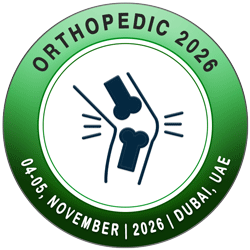Track: Orthopedic Radiology

Orthopedic radiology is a subspecialty of radiology that focuses on imaging techniques used to diagnose and monitor musculoskeletal conditions. These conditions include bone fractures, joint diseases, soft tissue disorders, and congenital deformities. Orthopedic radiologists use a variety of imaging modalities, including X-rays, MRI, CT scans, and ultrasound, to evaluate the structure and function of bones, muscles, joints, and ligaments. Accurate imaging plays a crucial role in the diagnosis, treatment planning, and follow-up care of orthopedic patients.
Key Topics and Highlights:
X-Ray Imaging in Orthopedics: The use of traditional X-rays to detect bone fractures, joint dislocations, arthritis, and degenerative bone diseases.
Magnetic Resonance Imaging (MRI): The role of MRI in evaluating soft tissue injuries, such as ligament tears, tendon damage, and cartilage problems, alongside bone and joint imaging.
Computed Tomography (CT) Scans: Advanced imaging for complex bone fractures, joint injuries, and assessment of bone tumors or infections.
Ultrasound in Orthopedic Diagnosis: Non-invasive imaging technique for soft tissue assessment, including tendons, muscles, and joint effusions, and its use in guiding injections or aspirations.
Bone Densitometry (DEXA): The application of DEXA scans in diagnosing and monitoring osteoporosis and other bone density-related conditions.
Summary:
The session on orthopedic radiology will provide in-depth discussions on the imaging modalities used in diagnosing musculoskeletal conditions, with a focus on their applications in clinical practice. Key areas will include the use of X-rays, MRIs, CT scans, and ultrasound in assessing bone fractures, joint diseases, and soft tissue injuries. Experts will discuss the importance of accurate imaging in treatment planning, monitoring disease progression, and guiding interventions such as joint injections or surgery. This session will also explore the role of advanced imaging techniques in detecting and managing bone tumors, degenerative conditions, and osteoporosis, providing attendees with the knowledge to effectively utilize radiology in orthopedic care.
Scientific Highlights
- Orthopedic Surgery
- Orthopedics and Sports medicine
- Orthopedics and Arthroscopy
- Orthopedic Physiotherapy
- AI and Robotics in Orthopedics
- Arthritis: Types, Diagnosis and Treatment
- Arthoplasty and Oncology
- Musculoskeletal Disorders, Medical and Clinical Trials
- Rheumatology and Arthritis
- Foot & Ankle Surgery
- Spine Disorders and Surgery
- Physical Medicine and Rehabilitation
- Neurology and Orthopedic surgery
- Orthopedic Radiology
- Orthopedics and Osteoporosis
- Other Orthopedic Trauma: Surgery and Conditions


